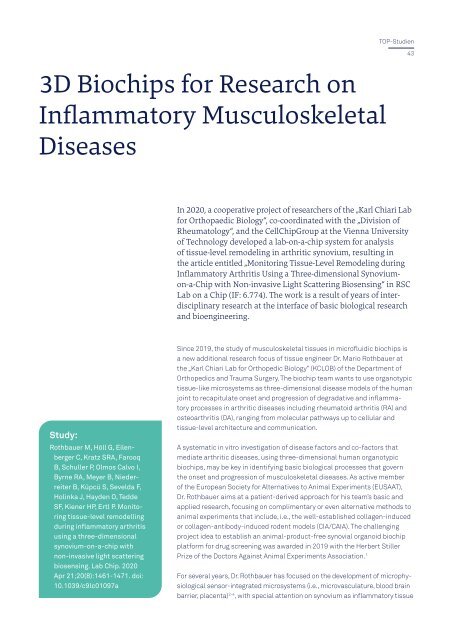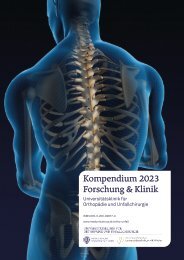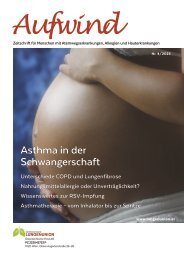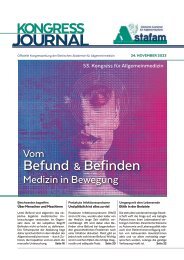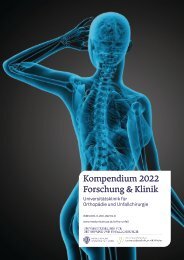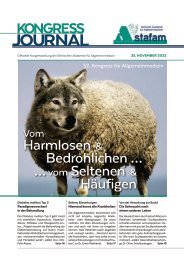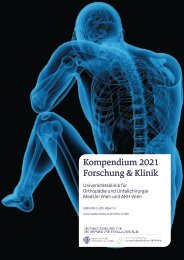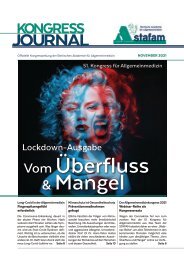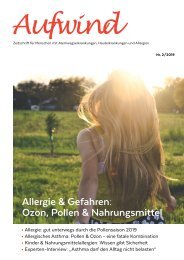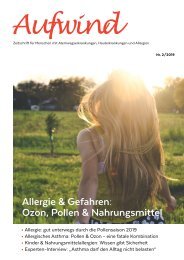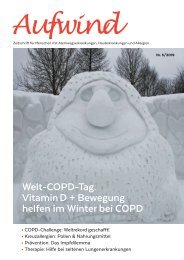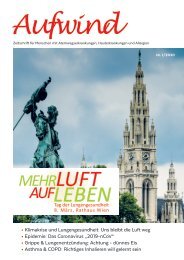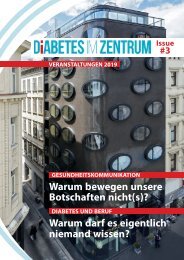Kompendium 2020 Forschung & Klinik
Das Kompendium 2020 der Universitätsklinik für Orthopädie und Unfallchirurgie von MedUni Wien und AKH Wien (o. Univ.-Prof. R. Windhager) stellt einen umfassenden Überblick über die medizinsichen Leistungen und auch die umfangreichen Forschungsfelder dar. Die Veröffentlichungen zeigen die klinische Relevanz und innovative Ansätze der einzelnen Forschungsrichtungen. Herausgeber: Universitätsklinik für Orthopädie und Unfallchirurgie MedUni Wien und AKH Wien Prof. Dr. R. Windhager ISBN 978-3-200-07715-7
Das Kompendium 2020 der Universitätsklinik für Orthopädie und Unfallchirurgie von MedUni Wien und AKH Wien (o. Univ.-Prof. R. Windhager) stellt einen umfassenden Überblick über die medizinsichen Leistungen und auch die umfangreichen Forschungsfelder dar. Die Veröffentlichungen zeigen die klinische Relevanz und innovative Ansätze der einzelnen Forschungsrichtungen.
Herausgeber: Universitätsklinik für Orthopädie und Unfallchirurgie
MedUni Wien und AKH Wien
Prof. Dr. R. Windhager
ISBN 978-3-200-07715-7
You also want an ePaper? Increase the reach of your titles
YUMPU automatically turns print PDFs into web optimized ePapers that Google loves.
3D Biochips for Research on<br />
Inflammatory Musculoskeletal<br />
Diseases<br />
TOP-Studien<br />
43<br />
In <strong>2020</strong>, a cooperative project of researchers of the „Karl Chiari Lab<br />
for Orthopaedic Biology“, co-coordinated with the „Division of<br />
Rheumatology“, and the CellChipGroup at the Vienna University<br />
of Technology developed a lab-on-a-chip system for analysis<br />
of tissue-level remodeling in arthritic synovium, resulting in<br />
the article entitled „Monitoring Tissue-Level Remodeling during<br />
Inflammatory Arthritis Using a Three-dimensional Synoviumon-a-Chip<br />
with Non-invasive Light Scattering Biosensing“ in RSC<br />
Lab on a Chip (IF: 6.774). The work is a result of years of interdisciplinary<br />
research at the interface of basic biological research<br />
and bioengineering.<br />
Study:<br />
Rothbauer M, Höll G, Eilenberger<br />
C, Kratz SRA, Farooq<br />
B, Schuller P, Olmos Calvo I,<br />
Byrne RA, Meyer B, Niederreiter<br />
B, Küpcü S, Sevelda F,<br />
Holinka J, Hayden O, Tedde<br />
SF, Kiener HP, Ertl P. Monitoring<br />
tissue-level remodelling<br />
during inflammatory arthritis<br />
using a three-dimensional<br />
synovium-on-a-chip with<br />
non-invasive light scattering<br />
biosensing. Lab Chip. <strong>2020</strong><br />
Apr 21;20(8):1461-1471. doi:<br />
10.1039/c9lc01097a<br />
Since 2019, the study of musculoskeletal tissues in microfluidic biochips is<br />
a new additional research focus of tissue engineer Dr. Mario Rothbauer at<br />
the „Karl Chiari Lab for Orthopedic Biology“ (KCLOB) of the Department of<br />
Orthopedics and Trauma Surgery. The biochip team wants to use organotypic<br />
tissue-like microsystems as three-dimensional disease models of the human<br />
joint to recapitulate onset and progression of degradative and inflammatory<br />
processes in arthritic diseases including rheumatoid arthritis (RA) and<br />
osteoarthritis (OA), ranging from molecular pathways up to cellular and<br />
tissue-level architecture and communication.<br />
A systematic in vitro investigation of disease factors and co-factors that<br />
mediate arthritic diseases, using three-dimensional human organotypic<br />
biochips, may be key in identifying basic biological processes that govern<br />
the onset and progression of musculoskeletal diseases. As active member<br />
of the European Society for Alternatives to Animal Experiments (EUSAAT),<br />
Dr. Rothbauer aims at a patient-derived approach for his team’s basic and<br />
applied research, focusing on complimentary or even alternative methods to<br />
animal experiments that include, i.e., the well-established collagen-induced<br />
or collagen-antibody-induced rodent models (CIA/CAIA). The challenging<br />
project idea to establish an animal-product-free synovial organoid biochip<br />
platform for drug screening was awarded in 2019 with the Herbert Stiller<br />
Prize of the Doctors Against Animal Experiments Association. 1<br />
For several years, Dr. Rothbauer has focused on the development of microphysiological<br />
sensor-integrated microsystems (i.e., microvasculature, blood brain<br />
barrier, placenta) 2-4 , with special attention on synovium as inflammatory tissue


